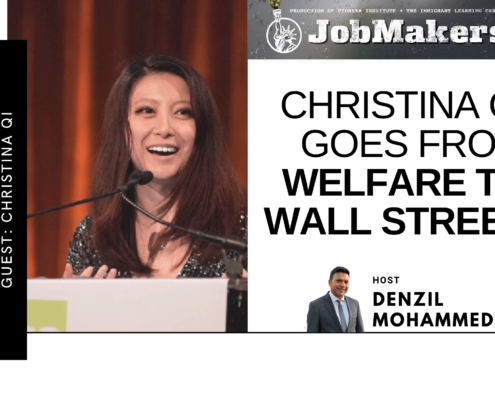Julie King Brings Authentic Mexican Cuisine to Boston
/in Economic Opportunity, Featured, JobMakers /by Editorial Staff
This week on JobMakers, host Denzil Mohammed talks with Julie King, immigrant from Mexico and founder of Villa Mexico Café in the financial district of Boston. They discuss the challenges of re-launching a career in a new country. It’s not atypical for an immigrant to start at a lower rung of the economic and social ladder than they previously enjoyed – but it’s a win when they persevere despite the pains, and thrive. A powerful lawyer in Mexico City, Julie at first found the American Dream elusive, initially delivering newspapers at 3 am for work. Then, a new opportunity arose, driven by a yearning for real Mexican cuisine. Today, she is full of admiration and respect for the country that allowed her to become a successful business owner, as you’ll hear in this week’s JobMakers.
Guest:
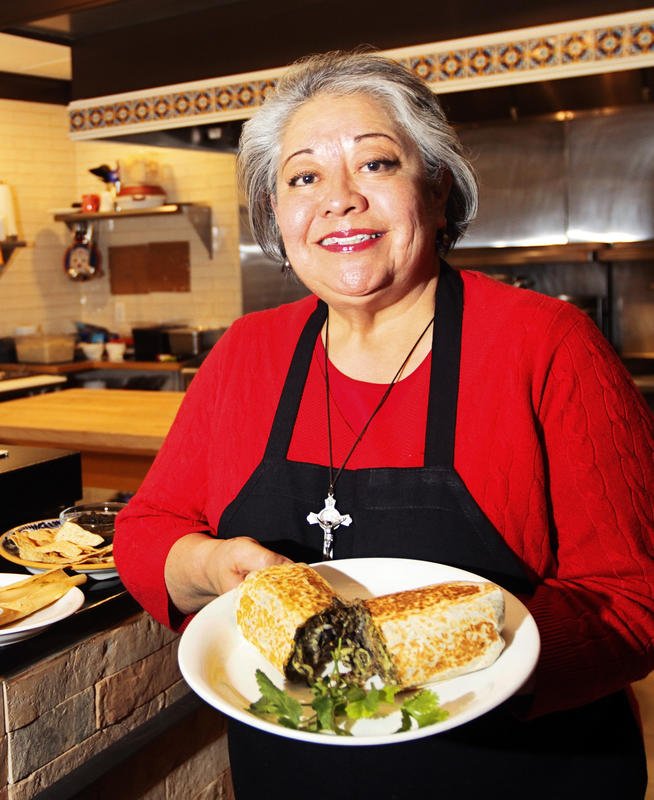 Julie King is the founder and owner of Villa México Café. Known as the (in)famous “Momma King,” she’s been a mentor, an adoptive mom, a nagger, and a local food industry personality. Villa México Café is an immigrant-women-family-owned restaurant that’s operated for 20 years. The restaurant’s mission is to bring authentic Mexican food and culture to the people of New England as one of the first authentic Mexican restaurants in Massachusetts. Villa México Café had its origins in Woburn, Mass. Momma King, owner, manager, cook, cleaner and everything else, moved there with her daughter, Bessie, after her American husband passed away from Alzheimer’s. A lawyer in Mexico, Julie could not litigate in Massachusetts without going to school again. She went into business with one mission: to bring authentic, homemade Mexican food to the people of New England. The first two Villa México Café locations were in Woburn. In 2006 Julie relocated to a gas station store in Beacon Hill, where the restaurant earned its “Best Burrito in Boston” title from Boston Phoenix and Improper Bostonian. The latest Villa México Café opened in Boston’s Financial District in 2016.
Julie King is the founder and owner of Villa México Café. Known as the (in)famous “Momma King,” she’s been a mentor, an adoptive mom, a nagger, and a local food industry personality. Villa México Café is an immigrant-women-family-owned restaurant that’s operated for 20 years. The restaurant’s mission is to bring authentic Mexican food and culture to the people of New England as one of the first authentic Mexican restaurants in Massachusetts. Villa México Café had its origins in Woburn, Mass. Momma King, owner, manager, cook, cleaner and everything else, moved there with her daughter, Bessie, after her American husband passed away from Alzheimer’s. A lawyer in Mexico, Julie could not litigate in Massachusetts without going to school again. She went into business with one mission: to bring authentic, homemade Mexican food to the people of New England. The first two Villa México Café locations were in Woburn. In 2006 Julie relocated to a gas station store in Beacon Hill, where the restaurant earned its “Best Burrito in Boston” title from Boston Phoenix and Improper Bostonian. The latest Villa México Café opened in Boston’s Financial District in 2016.
Get new episodes of JobMakers in your inbox!
Read a Transcript of This Episode
Please excuse typos.
Denzil Mohammed:
I’m Denzil Mohammed and welcome to Jobmakers.
Denzil Mohammed:
Moving to a new country is usually hard, emotionally, financially, even health wise. And it’s not atypical for the immigrant to start at a lower rung of the economic and social ladder than they previously enjoyed. But it’s a win when he or she perseveres despite the pains, and is able to thrive for Julie King immigrant, from Mexico and founder of Villa Mexico Cafe in the financial district of Boston, that step down was steep. A powerful lawyer in Mexico city. She ended up delivering newspapers at 3:00 AM for work in the us, a widowed mother of one. The American dream to her was a nightmare. That was until an opportunity driven by a yearning for real Mexican food collided. Even then the nightmares didn’t entirely stop, but she kept at it. And after 20 something years is full of admiration and respect for the country that allowed her to become a business owner respect for sure, but maybe not love as she tells her tale. She gives a nuanced take on the idea that you can love both of your home countries. The same as you hear in this week’s job makers, Julie King, founder, and owner of Villa Mexico cafe, Water street, Boston. Welcome to the Jobmakers podcast. How are you?
Julie King:
Good. Good, good. Thank you, my dear, to be honest with you. I little tired because I have been working today since six o’clock in the morning.
Denzil Mohammed:
I was about to say it’s a Friday afternoon. You must be really exhausted. Tell us a little bit about your business and why do you think it’s special?
Julie King:
Okay. Villa Mexico Cafe started in 1999, because I wanted to show the people what is authentic Mexican food it’s special because we serve authentic Mexican food in this place. And since I open it day one, they know that I don’t serve nachos because they are not from Mexico. They are from Texas. We don’t serve nachos and we don’t serve for example, avocado with lobster, because we are not a food place. We are authentic. That’s what it makes my place special because I think that we are one of the few authentic Mexican restaurants in New England.
Denzil Mohammed:
I would imagine so. And a lot of people in America, I’m sure they’re feeding new Mexican food.
Julie King:
For example, today, the lady told me, can you put, do you put lettuce and onion in your burrito? I said, no, I don’t. Why not? Because that is not, we don’t. It is not the way that we do it in Mexico. It’s only rice beans, the meat of your choice, the salsa avocado. And that’s it? Oh my God, but that is not Mexican food. I said, no, you are right. It’s not Mexican food, the authentic, it it’s Mexican food, but authentic Mexican food, you are here to get authentic Mexican food and they still don’t get it. And you know, what is the worst thing? What the worst thing is that I know that Mexican food is a very good business. When they said that’s a Mexican restaurant, let’s go that. And they spend a lot of money for eating Mexican food, but to serve authentic Mexican food and especially home made there is nobody, but
Denzil Mohammed:
I love how you stick to your guns. You know, keep it authentic Mexican, despite what the customer may think that they want or may expect. But you are actually a lawyer in your previous life in Mexico. Yeah. So how come this drastic change of course in your life?
Julie King:
Completely. My dear in Mexico, my husband used to tell me that I was a big shot because I used to be the legal director for the Holidays hotel chain in Mexico City.
Denzil Mohammed:
Wow.
Julie King:
That was beautiful. It was an incredible, incredible job. I loved it. I was traveling. I used to talk to ministers, you know, in the Mexican government, even with the president, we’d have breakfast and meetings and things like that with the ambassador of the United States, big people, you know, and I was only in those days, 27 years old, but I was a big shock. Like my, like my told me that was my best, best job I ever had because I enjoy it. It made me really responsible. But then I got married. I met my husband and he, he was American an American officer, the Navy American officer, we got married and then I have to quit my job to come to the states and live in the states. But yeah, I was a big shot.
Denzil Mohammed:
Arguably, you’re still a big shot now, “Momma” King. So take us back to life in Mexico City.
Julie King:
Beautiful. Of course. I mean it like in your country, you know, my country is Mexico and it is, it was so nice, so beautiful because all the families in those days, they are very conservatives. They are all the schools. So we’re very educated that we didn’t have the rich people, medium class or the poor ones. Everybody was the same, the same thing. And we used to go everybody to the same official school. We didn’t have private school. Everybody, you, you could know your, your friends, your neighbors, and everybody was a family. And that’s the way we grew up. And I love it. And that’s why we are, I am very, very attached to my country because I love my country a lot because of all my, the memories that I have when I was a kid with all my friends that I still have, my friendship still exists with those guys.
Julie King:
And we had a very good friends and we have incredible memories when we get together. And we go like, remember what we were used to do in the kindergarten, or remember what we used to do in the elementary school. And this is a real life. And I, you a secret idea. All the immigrants come to the United States because they have a big dream, which they call the American dream. You know what being in the states is not my dream. It’s my nightmare. Why? Because I really suffered a lot when I came to the states, even when I was married and I was living in Texas, I moved, we moved from Mexico to Texas. And then when I moved to Boston with my daughter, oh my God, it was a nightmare because I received such an insult that people was extremely right now is better.
Julie King:
But in those days they could, everybody could insult you and nobody say anything to you. It was really hard to me getting into the Bostonian’s life because they, it is not easy for them to open. It’s so difficult. And, and as a woman, you know, single mother be by myself and myself and in Mexico. I used to have a lot of friends, my family, my support, my business, as a lawyer. And in here, it was horrible. For example, let me tell you, in Mexico, we have a beautiful house and easily have it. And it is a big house with garden and for bedrooms and living room, a huge living room or whatever. But it’s, I have my house in here. I didn’t know how the rents were. And I have to go into a little bitty place with two small bedrooms. And I was like, oh my God.
Julie King:
It was the first time I used to live in an apartment. Then in Mexico, I have my daughter’s nanny and my, and the people who help me in the house and my gardener and my driver, because like my husband said, I was a big shot, you know? And in here we are not used to do anything, but the problem is that we, we are not used to clean the house or we are not used to wash the dishes or to wipe the clothes. We are not used to that things, especially because I was having my daughter’s nanny. When we move me and my daughter to the states, I said, okay, I don’t mind. I’m going to get somebody to clean my house. And just to get a person, she charge me like $200 in those days for cleaning my house and washing my clothes. And I said, what two?
Julie King:
It was very expensive and I couldn’t afford it. So besides working and getting up at three o’clock in the morning and coming back and be washing my day, I have to clean my house. I took to watch dishes to go. It has been a nightmare. My dear, and I didn’t know your regulations in the states. There is a lot of regulations, completely different, like my country. And I was like crazy. I was crying every day. I was really bad and nobody could help me. But at the same time, in the meantime, I was opening my way to the being in Boston. I found good people that was welcome me. And probably they feel sorry for me, you know, because I was, I don’t know. I was really lost, lost being by myself and my daughter
Denzil Mohammed:
Without a solid support network. You’re really just on your own, not having family around is, and this is why family reunification is so important to the American immigration system, because we need our families there. We need our parents, our kids cuz that’s that what, that’s, what we rely on. We don’t have anything else to rely on. Right? So I can imagine how difficult that must be. And a lot of Americans don’t realize that when immigrants move here, they often take a step down. You know, your first job is not gonna be anything like the job that you had in your home countries. You have to work yourself back up. Even for you as a lawyer, you would have to retake all your law law years of law school similar for doctors who have to redo residencies 20 years ago, they would’ve been markedly fewer opportunities from the SBA, from different lending organizations. I’m sure a lot of discrimination with banks. How, how did you do it? How did you start this business? How, how many times did you fail?
Julie King:
Well, you say it right with, without family with no help. With not somebody to, to put my head on the shoulder and cry with doesn’t receiving any advice or at least welcome home or nothing. I didn’t have in my food. I couldn’t find good Mexican food in Boston. So I said, oh my God, no. And every time I wanted to go and have some breakfasts or some, some kind of my food, you know, we were me and my daughter were so sad and very disappointed that I said, okay, I’m going to show these people. What is the authentic Mexican food? Because I didn’t like the way they were serving the Mexican food. So that’s why it make me start my business. How all they, God knows. Because to be honest with you, I thought to come and work as a lawyer in the states and you just said, right?
Julie King:
I said, I don’t care. I’m going to work as a lawyer because I am a good lawyer. And when I went to apply for the first job, they requested my license and I gave them the one in Mexico and they said, what is this? You cannot work in here with that. I said, so what do you mean? I am a lawyer. Yeah. Wonderful. But you need to request your license. I said, and where do I gotta go and get it? And they told me, you gotta go to the, to the school. I said, what do you mean to the school? Yeah. You have to, you have to start your, your lawyer school again to get your license. And in these days
Denzil Mohammed:
That was an option.
Julie King:
It wasn’t like now that in, in less than six months, you can get your license. In those days, you have to go to the school for three years. And then I said, oh my God. And what do I do? I raise my daughter. And I, I, I take care of my daughter or I go to the school and pay for my school. And one day my, my sister took some vacations and she came to visit me in Uber. And we were walking by Google center and I saw this little bit place, very nice place. And I said, look, there is a playlist. Let’s go see how it looks inside. And we both were seen through the window, like, oh my God, this is a restaurant. And this and that. And look at it, got chairs and tables and a counter. And she said, do you think that it could be a good, a good place?
Julie King:
So you can set a business? I said, my God, I don’t have any money. How can I start a business? Why do you go and ask how much they want to have for rent? So I went next door and it was a laundry. And I asked to the guy, I said, do you know somebody who can gimme information about the place next door? What do you want to know? I said, I would like to know how much is the rent and what do they need to, what are the requirements? And I would like to know who do I have to talk? What do you wanna to, what do you have the place for? And I said, okay. I would like to have a Mexican restaurant in there. Oh, wow. It used to be like what they call it? Rose beef. Yeah. It was a rose beef place, but the guy couldn’t pay the rent and he left everything.
Julie King:
I said, are you kidding me? I would like to talk to the owner to the landlord. And he said, I am the landlord. And how much do you want for rent? And guess what? He said, $500. I said, what? 500, go ahead. I will help you to grow. What I did was a dream. God helped me and my, my, my sister stayed there for three months and we both cleaned the restaurant painted. And we, but of course, I didn’t know the requirements. These guy told me that I sit and use the license that were for the grocery place. And I believe him because he was the landlord. But when I tried to open the restaurant, I remember this day I was on my knees, watching the floor and cleaning everything. And we painted the chairs and it was so bright, so beautiful. Red collar, jello, color, yellow, Navy blue.
Julie King:
And it started looking so beautiful. And then I was on my knees, cleaning the floor. And when I saw a pair of shoes and saw pants, I pick up my face and I said, oh, I’m sorry. We are not open yet. And he said, and I, and he told me, and I don’t think that you will open for a while. You said you are going to have a Mexican restaurant. And this is for another restaurant. I said, yeah. So what do I have to do? And here he is. He said, I am from the battlefield. You need to go the permit to the neighborhood. You need to get a meeting. You need to apply for your license. That took me three months to get everything ready. In October of 1999, the first October, the October, the first I could open my location. And that’s the way we started.
Denzil Mohammed:
Wow. That is such an ordeal. I know that you ended up having to close that location. You opened another one in Woburn, and then you close that and opened up your first Boston location in beacon hill, out of a gas station. And now you’re on water street in the financial district. You have come a long way. How has your how has your cafe been received by the financial district?
Julie King:
I have a lot when I was in, in my location. I have a lot of people coming from, from Boston and the surrounding areas, Boston, Lexington, Arlington, Stoneham rock the everywhere. And I have a line on the door trying to, to, to get inside. And then it was incredible, beautiful, beautiful place, really. So we grew up and then when we ended up in beacon hill in the little gas station, the people in Beacon hill of course made, I mean, just the rich people lives in Beacon hill, but they were so nice and beautiful to me because I don’t know why everybody said that I am a funny person, but I am not funny, whatever I am like, I am a very honest and person. I see you. And I tell you, and I talk to you with the truth. And I met Congressman for the English, very rich people director from the banks from big companies. And when I saw them to me, they were not the rich people living in beacon hill. They were my friends, you know, like you and I talking, and to me, everybody is the same. And they was having a ball with me and we become good friends and they were helping me. And they were happy with the food and they were really taking care of us. That’s when I start being a really happy person with a neighbor who, because they accept us. Incredible. Incredible good.
Denzil Mohammed:
So you, you have stated in the past that your mission is to not only bring authentic Mexican food to new England, but also culture to educate your customers about the real history, culture and lifestyle of Mexico. Why is this your mission? Why, why do you think that’s
Julie King:
Important? Because for example, I give you a little example. Everybody goes crazy about cinco de Mayo and cinco de Mayo is just, we want a little bit battle, that’s it? And it’s not as I, I mean, it is important, but not in the way that is in here. We really appreciate our independence day. And it’s a big thing in Mexico, but the cinco de mayo is nothing, you know, and when I moved to Boston and I start finding out that cinco de mayo called wow, cinco de mayo. Wow. I said, wait a second. But you know, what is, and I was the first person that in the local TV, I told them cinco de mayo is nothing important. So please stop treating us like if it was someone independence day, Cinco de mayo is gringo de mayo.
Denzil Mohammed:
You’ve expressed tremendous pride in this interview about your home country in or your home country, Mexico. Is it possible for you to love or for anyone to love two countries, two cultures at the same time,
Julie King:
It’s not possible. <Laugh>
Denzil Mohammed:
Really
Julie King:
Let me tell you. I born in Mexico city, I was raised in our lost and with a love of family all together. And like I told you, in the beginning, we were exactly the same, but we were taught to respect our father and mother to love our family. And to be quiet whenever they call our attention, we, I didn’t grow up with a cell phone with a game boy or with a big machines. And we didn’t play the all day long in the TV. Here, everybody is doing their own stuff. They don’t get together. And if they go together, the parties, you know, they are always drinking. And to me to be here seeing different aggressive things, it is like I cannot get it. I cannot, I just cannot get it. I feel so sorry for all the kids that they don’t have the education, that they deserve to have because the father is working.
Julie King:
The mother is working and nobody’s taking care of them that they are not growing a, a good families together with values, but it is very difficult to love one country and to love the other one in the same way. Because just for one thing, I born in one place, not born in the states. I feel extremely respect for this country, which offers you many, many things. And I love it because I have to respect my second home and I have to respect and love the country that it give me my business and it helped me to grow. But in here, when we came, it was a big change. And I in a state to feel like happy I was suffering. But at the same time, I feel welcome because this was my husband’s country. And I work of this country as mine, but I cannot feel the same love that I have for my country, because I grew up in my country with probably with not too much money, but I got it with too much love. And in this country, I work so hard. I cry a lot. I make myself like my second home. I love Boston because it’s a beautiful place. I love it. But I still miss Mexico. It is like mixed feelings, you know?
Denzil Mohammed:
Oh, I totally get it. I totally get it. That was very heartfelt and very thoughtful. Thank you very much for opening up your heart and telling us your journey and your story. I was very moved by it. I think that this is gonna reach many Americans and they’re gonna learn so much more, not just about Mexican culture, but about the idea of the immigrant and the kinds of conflicts and stressors and things that, that we have to go through starting AF fresh in a new place. Thank you so much. Julie King, owner and founder of Villa Mexico Cafe in Boston’s financial district. Thank you so much for joining us on this podcast.
Julie King:
God bless you. And thank you for this opportunity.
Denzil Mohammed:
Jobmakers is a weekly podcast about immigrant entrepreneurship and contribution produced by Pioneer Institute, a think tank in Boston and the immigrant learning center in Malden, Massachusetts, a not-for-profit that gives immigrants a voice. Thanks for joining us for this week’s beautiful and complex story of immigrant entrepreneurs. Remember, you can subscribe to Jobmakers, apple podcast, Spotify, or wherever you get your podcasts. And please leave us a review. I’m Denzil Mohammed. See you next Thursday at noon for another Jobmakers.
Recent Episodes:

Mahmud Jafri Builds on a Pakistani Legacy in America
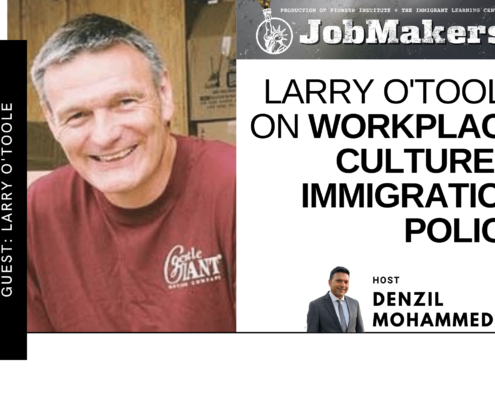
Larry O’Toole on Workplace Culture & Immigration Policy

Amar Sawhney on Sikhs, STEM & COVID
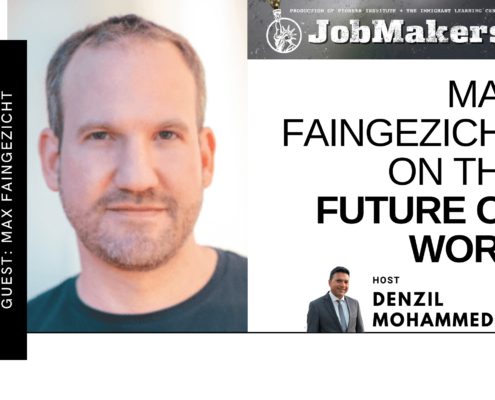
Max Faingezicht on the Skills Gap & the Future of Work
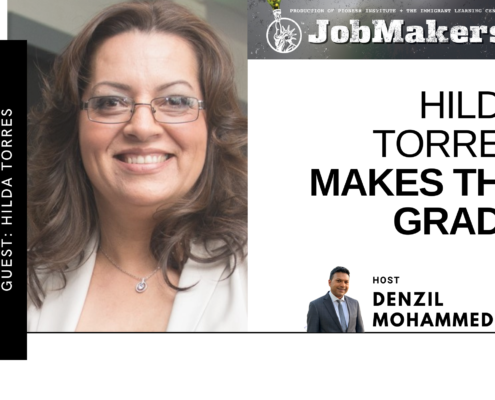
Hilda Torres Makes the Grade
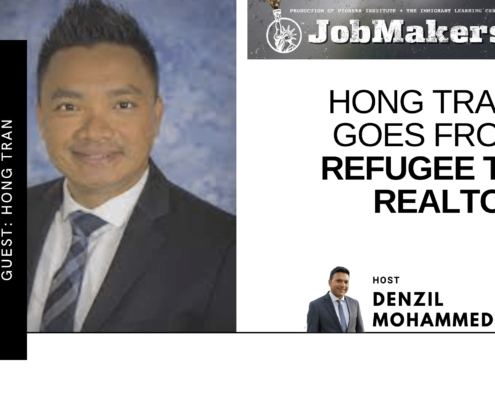
Hong Tran Goes from Refugee to Realtor
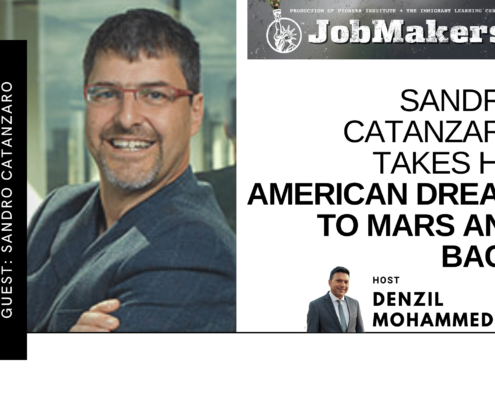
Sandro Catanzaro Takes His American Dream to Mars and Back
